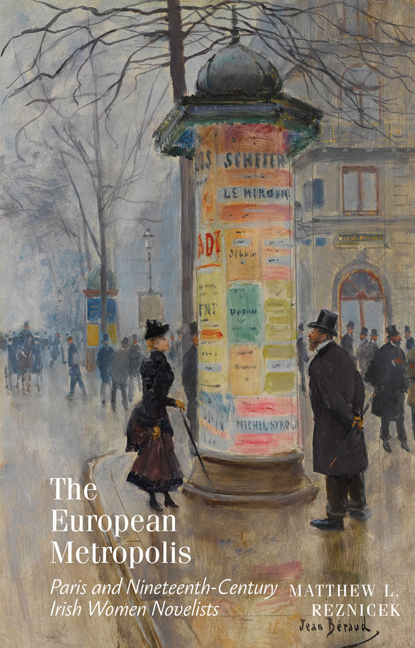Book contents
- Frontmatter
- Contents
- Acknowledgments
- Dedication
- Parvenir: An Introduction
- The Novice in the City: Sydney Owenson and the Bildung of Metropolitan Economics
- Much More than Only Le Bel Irlandois: Metropolitan Socioeconomics and Parisian Bildung in Maria Edgeworth's Ormond
- The New Jerusalem and the Rue Vavin: Urban Space, Economic Exchange, and Gendered Modernity in French Leave
- First Life-and then Fame: Gendered Fin-de-Siècle Cityscapes in Max
- A City She Must Postpone: A Conclusion
- Notes
- Works Cited
- Index
The Novice in the City: Sydney Owenson and the Bildung of Metropolitan Economics
- Frontmatter
- Contents
- Acknowledgments
- Dedication
- Parvenir: An Introduction
- The Novice in the City: Sydney Owenson and the Bildung of Metropolitan Economics
- Much More than Only Le Bel Irlandois: Metropolitan Socioeconomics and Parisian Bildung in Maria Edgeworth's Ormond
- The New Jerusalem and the Rue Vavin: Urban Space, Economic Exchange, and Gendered Modernity in French Leave
- First Life-and then Fame: Gendered Fin-de-Siècle Cityscapes in Max
- A City She Must Postpone: A Conclusion
- Notes
- Works Cited
- Index
Summary
In the atlas of Irish women's writing and of Irish literature more broadly, Sydney Owenson (Lady Morgan) (c. 1783–1859) remains exceptional for the geographic expansiveness of her oeuvre. A brief mapping of Owenson's literary career highlights what Ian Campbell Ross, Aileen Douglas, and Moyra Haslett are beginning to recognize as an historically global trend in Irish writing. Woman; or, Ida of Athens (1809), The Missionary (1811), O'Donnell: A National Tale (1814), Florence Macarthy (1818), The O'Briens and the O'Flahertys (1827), and The Princess; or, The Beguine (1835) refuse to accept a singular geographical category other than simply that of the global. These novels range from Greece in Woman to Portugal and Goa in The Missionary, Vienna and the Austro-Hungarian Empire in O'Donnell, New Granada and Columbia in Florence Macarthy, and Paris and Rome in The O'Briens and the O'Flahertys. This brief geographical sketch stretches from the Indian subcontinent to Paris, Dublin, and South America. Such a scope demonstrates the necessity of including Owenson in the broad project of mapping prose fiction, a project most clearly associated with Franco Moretti's attempts “to make the literary field longer, larger, and deeper,” even though Moretti's Atlas of the European Novel recognizes Ireland only to dismiss it. A critical mapping of Owenson's novels challenges the paradigmatic concept that one of the definitive characteristics of Irish literature is the privileged narrative locus of Ireland.
To suggest that the central location of Owenson's fiction is not Ireland but France, and more specifically Paris, is to reassert the exceptionally broad geographic range of her oeuvre and to reject a “pattern […] of exclusion” that seems to dominate in Irish literary criticism. While Moretti associates this exclusionary pattern with Jane Austen's novels, he conceives it in opposition to the historical and national tales of Walter Scott, which he relegates to the “Celtic Fringe.” This exclusionary pattern applies equally to the critical understanding of Sydney Owenson's novels, which has focused more on the Celtic space than on the role of the metropolis, especially Paris, in her novels.
- Type
- Chapter
- Information
- The European MetropolisParis and Nineteenth-Century Irish Women Novelists, pp. 25 - 62Publisher: Liverpool University PressPrint publication year: 2017



